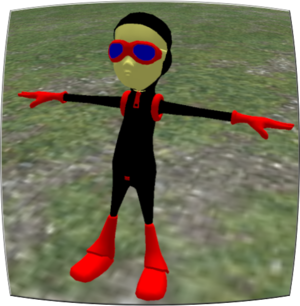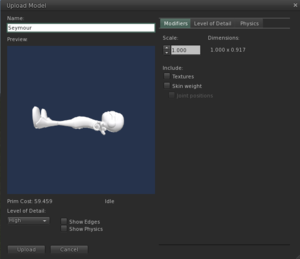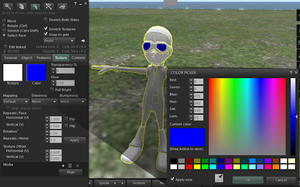Difference between revisions of "Mesh/Uploading a multi-face mesh"
| (36 intermediate revisions by 10 users not shown) | |||
| Line 1: | Line 1: | ||
{{Multi-lang}} | |||
{{Navbox/Mesh|advanced}} | |||
__NOTOC__ | __NOTOC__ | ||
| Line 5: | Line 7: | ||
Just as we can texture individual faces of a primitive differently, we can texture individual faces of meshes differently if the mesh has been properly set up for materials before import. | Just as we can texture individual faces of a primitive differently, we can texture individual faces of meshes differently if the mesh has been properly set up for materials before import. | ||
== | == Adding Materials With Your 3D Program == | ||
The first step is to get a multi- | To add Materials in Blender, refer to these two pages in the Blender Manual regarding creating/adding materials, and applying multiple materials to a model. | ||
* http://wiki.blender.org/index.php/Doc:2.5/Manual/Materials/Options | |||
* http://wiki.blender.org/index.php/Doc:2.5/Manual/Materials/Multiple_Materials | |||
==Autodesk Software users== | |||
If you are using Autodesk software to create your multifaced mesh, due to the way the uploader is currently behaving [ June, 2016 ] , please refrain from using spaces in your material names. Autodesk 3ds max by default names most 'Standard' materials "Material #33", "Material #34", "Material #35". The mesh uploader presently is truncating those names to all be "Material" , "Material" , "Material" (ignoring the space and everything after it) which then makes all MatID faces reference the same texture channel, creating some sort of abstract object that seems to have multiple material faces in world, but simply resets the moment it's moved, picked up, or adjusted in any fashion. To avoid this, try renaming your materials "Mat_A" , "Mat_B" , "Mat_C" or some other sort of naming convention that does not use spaces. Note: Underscores are perfectly valid characters. | |||
==Maya 2012 users== | |||
* selecting faces, apply few different lambert materials to your object, up to 8 per object. | |||
* then export as FBX file, don't export in maya as dae directly, it won't work. | |||
* then use the Autodesk FBX standalone converter version 2011.3 to convert to Collada. | |||
* the dae file is then ready for import. | |||
download the needed standalone Collada exporter here: | |||
* http://usa.autodesk.com/adsk/servlet/pc/item?siteID=123112&id=16126812 | |||
== Get a Second Life compatible mesh file == | |||
The first step is to get a multi-face mesh file that you want to upload to Second Life. Second Life's mesh import is able to read [https://collada.org/mediawiki/index.php/COLLADA_-_Digital_Asset_and_FX_Exchange_Schema COLLADA] ("''.dae''") files. | |||
# Click this link -- https://collada.org/owl/download.php?sess=0&parent=131&expand=1&order=name&curview=0&binary=1&id=707 -- to download the "''seymour.dae''" COLLADA file. | |||
# Save the file anywhere on your hard drive where you can find it later. | |||
== Upload the mesh file to Second Life == | == Upload the mesh file to Second Life == | ||
[[File: | [[File:Mesh_upload_model_seymour.png|300px|thumb|Upload Model window]] | ||
Upload the mesh file from your computer to Second Life: | |||
# Select '''Build''' > '''Upload''' > '''Model''' from the menu at the top of the Second Life Viewer. | |||
#: Alternatively, open '''My Inventory''', click the '''+''' button, and select '''Upload''' > '''Model'''. | |||
#: A file upload window opens. | |||
# Find and select the <code>seymour.dae</code> file from your computer. | |||
#: The Upload Model window appears. | |||
# Enter a name for your model in the '''Name''' field. | |||
# Click the '''Upload''' button. | |||
#: A new asset will appear in your inventory in the '''Objects''' folder. | |||
#: The new asset is named '''boyShape'''. | |||
{{Warning|While the Seymour asset does contain a rig, it is incompatible with the current Mesh Project Viewer code. If you enable '''Skin Weight''' before uploading, Seymour's skin will be generated incorrectly. You'll see the incorrect behavior in the tool preview window, and if uploaded, you'll see a group of large flickering triangles inworld.}} | |||
== Add your mesh object to the world and edit it == | == Add your mesh object to the world and edit it == | ||
[[Image:MeshWalkthrough-Complex Mesh Upload-Edit Face.png|right|300px|thumb|Edit goggle color]] | [[Image:MeshWalkthrough-Complex Mesh Upload-Edit Face.png|right|300px|thumb|Edit goggle color]] | ||
You | You can now manipulate your mesh as if it were any other object in your inventory: | ||
# Find your '''boyShape''' object in your '''Objects''' folder; if you're having trouble or have a large inventory, use your inventory's '''RECENT''' tab. | |||
# Drag the new object from your '''Objects''' folder to anywhere on the ground where you have permissions to build. | |||
#: The model appears on the ground. | |||
# Right-click the model and select '''Edit'''. | |||
#: The Edit Object window appears. | |||
# Click the '''Select Face''' radio button. | |||
# Left-click the goggle lenses of the model. | |||
# Click the color swatch in the Texture tab and change the color, or click the texture swatch and change the texture. | |||
# Add color and/or textures to other parts of the model (gloves, goggle frame, face, or cap) in the same way. | |||
{{KBvideo|qorvd6KJSuE|640|505|type=youtube}} | |||
Revision as of 17:30, 22 June 2016
Just as we can texture individual faces of a primitive differently, we can texture individual faces of meshes differently if the mesh has been properly set up for materials before import.
Adding Materials With Your 3D Program
To add Materials in Blender, refer to these two pages in the Blender Manual regarding creating/adding materials, and applying multiple materials to a model.
- http://wiki.blender.org/index.php/Doc:2.5/Manual/Materials/Options
- http://wiki.blender.org/index.php/Doc:2.5/Manual/Materials/Multiple_Materials
Autodesk Software users
If you are using Autodesk software to create your multifaced mesh, due to the way the uploader is currently behaving [ June, 2016 ] , please refrain from using spaces in your material names. Autodesk 3ds max by default names most 'Standard' materials "Material #33", "Material #34", "Material #35". The mesh uploader presently is truncating those names to all be "Material" , "Material" , "Material" (ignoring the space and everything after it) which then makes all MatID faces reference the same texture channel, creating some sort of abstract object that seems to have multiple material faces in world, but simply resets the moment it's moved, picked up, or adjusted in any fashion. To avoid this, try renaming your materials "Mat_A" , "Mat_B" , "Mat_C" or some other sort of naming convention that does not use spaces. Note: Underscores are perfectly valid characters.
Maya 2012 users
- selecting faces, apply few different lambert materials to your object, up to 8 per object.
- then export as FBX file, don't export in maya as dae directly, it won't work.
- then use the Autodesk FBX standalone converter version 2011.3 to convert to Collada.
- the dae file is then ready for import.
download the needed standalone Collada exporter here:
Get a Second Life compatible mesh file
The first step is to get a multi-face mesh file that you want to upload to Second Life. Second Life's mesh import is able to read COLLADA (".dae") files.
- Click this link -- https://collada.org/owl/download.php?sess=0&parent=131&expand=1&order=name&curview=0&binary=1&id=707 -- to download the "seymour.dae" COLLADA file.
- Save the file anywhere on your hard drive where you can find it later.
Upload the mesh file to Second Life
Upload the mesh file from your computer to Second Life:
- Select Build > Upload > Model from the menu at the top of the Second Life Viewer.
- Alternatively, open My Inventory, click the + button, and select Upload > Model.
- A file upload window opens.
- Find and select the
seymour.daefile from your computer.- The Upload Model window appears.
- Enter a name for your model in the Name field.
- Click the Upload button.
- A new asset will appear in your inventory in the Objects folder.
- The new asset is named boyShape.
While the Seymour asset does contain a rig, it is incompatible with the current Mesh Project Viewer code. If you enable Skin Weight before uploading, Seymour's skin will be generated incorrectly. You'll see the incorrect behavior in the tool preview window, and if uploaded, you'll see a group of large flickering triangles inworld.
Add your mesh object to the world and edit it
You can now manipulate your mesh as if it were any other object in your inventory:
- Find your boyShape object in your Objects folder; if you're having trouble or have a large inventory, use your inventory's RECENT tab.
- Drag the new object from your Objects folder to anywhere on the ground where you have permissions to build.
- The model appears on the ground.
- Right-click the model and select Edit.
- The Edit Object window appears.
- Click the Select Face radio button.
- Left-click the goggle lenses of the model.
- Click the color swatch in the Texture tab and change the color, or click the texture swatch and change the texture.
- Add color and/or textures to other parts of the model (gloves, goggle frame, face, or cap) in the same way.
<videoflash type="youtube">qorvd6KJSuE|640|505</videoflash>


